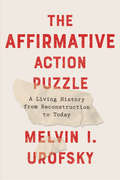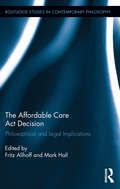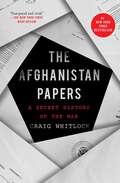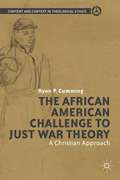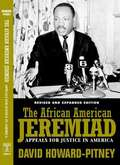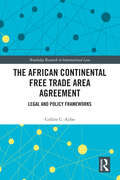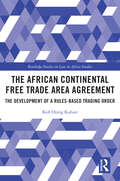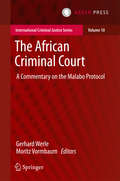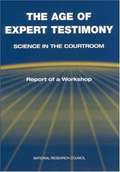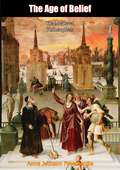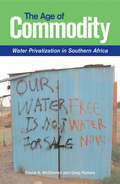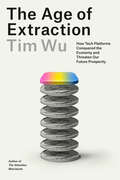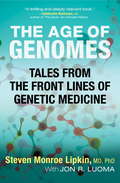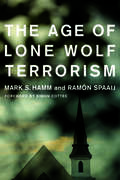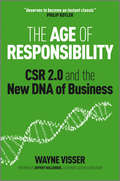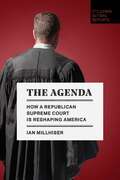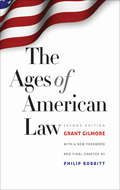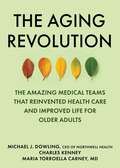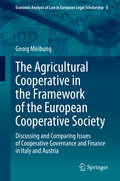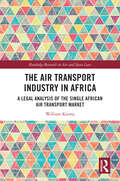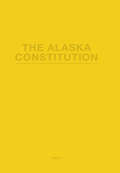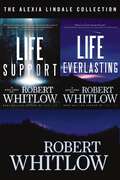- Table View
- List View
The Affirmative Action Puzzle: A Living History from Reconstruction to Today
by Melvin I. UrofskyA rich, multifaceted history of affirmative action from the Civil Rights Act of 1866 through today&’s tumultuous times From acclaimed legal historian, author of a biography of Louis Brandeis (&“Remarkable&” —Anthony Lewis, The New York Review of Books, &“Definitive&”—Jeffrey Rosen, The New Republic) and Dissent and the Supreme Court (&“Riveting&”—Dahlia Lithwick, The New York Times Book Review), a history of affirmative action from its beginning with the Civil Rights Act of 1866 to the first use of the term in 1935 with the enactment of the National Labor Relations Act (the Wagner Act) to 1961 and John F. Kennedy&’s Executive Order 10925, mandating that federal contractors take &“affirmative action&” to ensure that there be no discrimination by &“race, creed, color, or national origin&” down to today&’s American society. Melvin Urofsky explores affirmative action in relation to sex, gender, and education and shows that nearly every public university in the country has at one time or another instituted some form of affirmative action plan--some successful, others not. Urofsky traces the evolution of affirmative action through labor and the struggle for racial equality, writing of World War I and the exodus that began when some six million African Americans moved northward between 1910 and 1960, one of the greatest internal migrations in the country&’s history. He describes how Harry Truman, after becoming president in 1945, fought for Roosevelt&’s Fair Employment Practice Act and, surprising everyone, appointed a distinguished panel to serve as the President&’s Commission on Civil Rights, as well as appointing the first black judge on a federal appeals court in 1948 and, by executive order later that year, ordering full racial integration in the armed forces. In this important, ambitious, far-reaching book, Urofsky writes about the affirmative action cases decided by the Supreme Court: cases that either upheld or struck down particular plans that affected both governmental and private entities. We come to fully understand the societal impact of affirmative action: how and why it has helped, and inflamed, people of all walks of life; how it has evolved; and how, and why, it is still needed.
The Affordable Care Act Decision: Philosophical and Legal Implications (Routledge Studies in Contemporary Philosophy)
by Mark Hall Fritz AllhoffInterest in NFIB v. Sebelius has been extraordinarily high, from as soon as the legislation was passed, through lower court rulings, the Supreme Court’s grant of certiorari, and the decision itself, both for its substantive holdings and the purported behind-the-scene dynamics. Legal blogs exploded with analysis, bioethicists opined on our collective responsibilities, and philosophers tackled concepts like ‘coercion’ and the activity/inactivity distinction. This volume aims to bring together scholars from disparate fields to analyze various features of the decision. It comprises over twenty essays from a range of academic disciplines, namely law, philosophy, and political science. Essays are divided into five units: context and history, analyzing the opinions, individual liberty, Medicaid, and future implications.
The Afghanistan Papers: A Secret History of the War
by The Washington Post Craig WhitlockA Washington Post Best Book of 2021 The #1 New York Times bestselling investigative story of how three successive presidents and their military commanders deceived the public year after year about America&’s longest war, foreshadowing the Taliban&’s recapture of Afghanistan, by Washington Post reporter and three-time Pulitzer Prize finalist Craig Whitlock.Unlike the wars in Vietnam and Iraq, the US invasion of Afghanistan in 2001 had near-unanimous public support. At first, the goals were straightforward and clear: defeat al-Qaeda and prevent a repeat of 9/11. Yet soon after the United States and its allies removed the Taliban from power, the mission veered off course and US officials lost sight of their original objectives. Distracted by the war in Iraq, the US military become mired in an unwinnable guerrilla conflict in a country it did not understand. But no president wanted to admit failure, especially in a war that began as a just cause. Instead, the Bush, Obama, and Trump administrations sent more and more troops to Afghanistan and repeatedly said they were making progress, even though they knew there was no realistic prospect for an outright victory. Just as the Pentagon Papers changed the public&’s understanding of Vietnam, The Afghanistan Papers contains &“fast-paced and vivid&” (The New York Times Book Review) revelation after revelation from people who played a direct role in the war from leaders in the White House and the Pentagon to soldiers and aid workers on the front lines. In unvarnished language, they admit that the US government&’s strategies were a mess, that the nation-building project was a colossal failure, and that drugs and corruption gained a stranglehold over their allies in the Afghan government. All told, the account is based on interviews with more than 1,000 people who knew that the US government was presenting a distorted, and sometimes entirely fabricated, version of the facts on the ground. Documents unearthed by The Washington Post reveal that President Bush didn&’t know the name of his Afghanistan war commander—and didn&’t want to meet with him. Secretary of Defense Donald Rumsfeld admitted that he had &“no visibility into who the bad guys are.&” His successor, Robert Gates, said: &“We didn&’t know jack shit about al-Qaeda.&” The Afghanistan Papers is a &“searing indictment of the deceit, blunders, and hubris of senior military and civilian officials&” (Tom Bowman, NRP Pentagon Correspondent) that will supercharge a long-overdue reckoning over what went wrong and forever change the way the conflict is remembered.
The African American Challenge to Just War Theory
by Ryan P. CummingIn this innovative treatment of the ethics of war, Ryan P. Cumming brings classical sources of just war theory into conversation with African American voices. The result is a new direction in just war thought that challenges dominant interpretations of just war theory by looking to the perspectives of those on the underside of history and politics.
The African American Jeremiad: Appeals for Justice in America (Revised and Expanded Edition)
by David Howard-PitneyBegun by Puritans, the American jeremiad, a rhetoric that expresses indignation and urges social change, has produced passionate and persuasive essays and speeches throughout the nation's history. Showing that black leaders have employed this verbal tradition of protest and social prophecy in a way that is specifically African American, David Howard-Pitney examines the jeremiads of Frederick Douglass, Booker T. Washington, Ida B. Wells, W. E. B. DuBois, Mary McLeod Bethune, Martin Luther King, Jr. , and Malcolm X, as well as more contemporary figures such as Jesse Jackson and Alan Keyes. This revised and expanded edition demonstrates that the African American jeremiad is still vibrant, serving as a barometer of faith in America's perfectibility and hope for social justice. This new edition features: * A new chapter on Malcolm X * An updated discussion of Jesse Jackson * A new discussion of Alan Keyes
The African Canadian Legal Odyssey
by Barrington WalkerThe African Canadian Legal Odyssey explores the history of African Canadians and the law from the era of slavery until the early twenty-first century. ;This collection demonstrates that the social history of Blacks in Canada has always been inextricably bound to questi52.99ons of law, and that the role of the law in shaping Black life was often ambiguous and shifted over time.Comprised of eleven engaging chapters, organized both thematically and chronologically, it includes a substantive introduction that provides a synthesis and overview of this complex history. This outstanding collection will appeal to both advanced specialists and undergraduate students and makes an important contribution to an emerging field of scholarly inquiry.
The African Continental Free Trade Area Agreement: Legal and Policy Frameworks (Routledge Research in International Law)
by Collins C. AjiboThis book provides a comprehensive assessment of African economic integration through the lens of International Economic Law. The analysis is contextualised within the prevailing regional economic integrations, the WTO and the peculiarity of the AfCFTA.Through legal analysis, bolstered by economic and political dimensions, the book illustrates the complex interplay of diverse factors that shape the AfCFTA. Each chapter presents a separate element of economic integration within the principles of international economic law, with an interdisciplinary approach encompassing legal, economic and political perspectives. Covering topics such as economic integration and multilateralism, market access, exceptions, trade facilitation, rules of origin and non-tariff barriers, the book also discusses trade remedies, dispute settlement, investment, intellectual property and completion policy. Additionally, human rights, corporate social responsibility and sustainable development principles are discussed, alongside small and medium-sized enterprises (SMEs), digital trade and gender in economic integration.The book will be of interest to students, instructors, practitioners and nonpractitioners in this area of international economic law.
The African Continental Free Trade Area Agreement: The Development of a Rules-Based Trading Order (Routledge Studies on Law in Africa)
by Kofi Oteng KufuorIn 2018, the members of the African Union adopted the African Continental Free Trade Area Agreement (AfCFTA). This book examines the AfCFTA, dissecting its key provisions. It stresses the importance of the AfCFTA in the context of increasing episodes of trade protection in Africa, and it theorizes on the role of the treaty organs. The book also examines the importance of citizen participation for the success of the AfCFTA, as well as exploring the role sub-state actors can play. Ultimately, the study adds to the understanding of the array of problems that are associated with regional trade in Africa and the role law plays in resolving these problems. It will be of importance to academics and students of international law, especially those with an interest in African trade law, as well as legal professionals and policymakers.
The African Criminal Court
by Gerhard Werle Moritz VormbaumThis book examines the mutual recognition of judicial decisions in European criminal law as a cornerstone of judicial co-operation in criminal matters in the European Union. Providing comprehensive content and combining theoretical and practical aspects, it covers all of the major issues surrounding mutual recognition. The book analyses its definition, genesis, principles, case law, implementation and evaluation. Special attention is given to mutual recognition measures, namely European arrest warrant (i. e. surrender procedure), mutual recognition of custodial sentences, and measures involving deprivation of liberty, mutual recognition of probation measures and alternative sanctions, mutual recognition of financial penalties, mutual recognition of confiscation orders, the European supervision order in pre-trial procedures (i. e. mutual recognition of supervision measures as an alternative to provisional detention), the European investigation order (i. e. free movement of evidence), and the European protection order (i. e. mutual recognition of protection orders). Instead of focusing solely on a criminal law approach, the book also considers the subject from the perspectives of European Union law and International criminal law.
The Age Of Expert Testimony: Science In The Courtroom
by Science Technology Law PanelThe federal courts are seeking ways to increase the ability of judges to deal with difficult issues of scientific expert testimony. The workshop explored the new environment judges, plaintiffs, defendants, and experts face in light of "Daubert" and "Kumho," when presenting and evaluating scientific, engineering, and medical evidence.
The Age of Belief: The Medieval Philosophers
by Anne Jackson FreemantleDuring the thousand-year span of the Middle Ages, philosophers discussed the eternal questions of mankind within the most unified society known to Western culture, linked by a single religious faith which encompassed all European life. Inside this framework, scholars drew upon Greek thought and Christian revelation, exploring the nature of being, the problem of fate versus free will, and various views of ultimate reality. This perceptive book by a noted author and critic traces the great arguments of Medieval philosophy through the writings of major thinkers like St. Augustine, St. Thomas Aquinas, Boethius and Abelard.
The Age of Commodity: Water Privatization in Southern Africa
by David McDonald Greg RuitersAs globalization and market liberalization march forward unabated the global commons continue to be commodified and privatized at a rapid pace. In this global process, the ownership, sale and supply of water is increasingly a flashpoint for debates and conflict over privatization, and nowhere is the debate more advanced or acute than in Southern Africa. The Age of Commodity provides an overview of the debates over water in the region including a conceptual overview of water 'privatization', how it relates to human rights, macro-economic policy and GATS. The book then presents case studies of important water privatization initiatives in the region, drawing out crucial themes common to water privatization debates around the world including corruption, gender equity and donor conditionalities. This book is powerful and necessary reading in our new age of commodity.
The Age of Extraction: How Tech Platforms Conquered the Economy and Threaten Our Future Prosperity
by Tim WuTech platforms manipulate attention, extract wealth, and deepen inequality. In this new book, Tim Wu (The Attention Merchants) explains how we can reclaim control and create a balanced economy that works for everyone.&“The magic of Tim Wu&’s The Age of Extraction is its simplicity. Wu deftly breaks down one of the greatest challenges of our age—the unaccountable power of tech platforms—into such digestible pieces that the solutions for what to do become dead obvious. Essential reading.&”—Karen Hao, author of Empire of AI: Dreams and Nightmares in Sam Altman&’s OpenAI "It&’s not just in your head—your online life is draining your wallet.... [The Age of Extraction is] a sharp and eye-opening introduction to how we arrived at platform capitalism—where no good click goes unmonetized.&”—Kirkus Reviews Our world is dominated by a handful of tech platforms. They provide great conveniences and entertainment, but also stand as some of the most effective instruments of wealth extraction ever invented, seizing immense amounts of money, data, and attention from all of us. An economy driven by digital platforms and AI influence offers the potential to enrich us, and also threatens to marginalize entire industries, widen the wealth gap, and foster a two-class nation. As technology evolves and our markets adapt, can society cultivate a better life for everyone? Is it possible to balance economic growth and egalitarianism, or are we too far gone?Tim Wu—the preeminent scholar and former White House official who coined the phrase &“net neutrality&”—explores the rise of platform power and details the risks and rewards of working within such systems. The Age of Extraction tells the story of an Internet that promised widespread wealth and democracy in the 1990s and 2000s, only to create new economic classes and aid the spread of autocracy instead. Wu frames our current moment with lessons from recent history—from generative AI and predictive social data to the antimonopoly and crypto movements—and envisions a future where technological advances can serve the greatest possible good. Concise and hopeful, The Age of Extraction offers consequential proposals for taking back control in order to achieve a better economic balance and prosperity for all.
The Age of Genomes: Tales from the Front Lines of Genetic Medicine
by Steven Monroe Lipkin Jon LuomaA leading geneticist explores what promises to be one of the most transformative advances in health and medicine in historyAlmost every week, another exciting headline appears about new advances in the field of genetics. Genetic testing is experiencing the kind of exponential growth once seen with the birth of the Internet, while the plummeting cost of DNA sequencing makes it increasingly accessible for individuals and families.Steven Lipkin and Jon Luoma posit that today's genomics is like the last century's nuclear physics: a powerful tool for good if used correctly, but potentially dangerous nonetheless. DNA testing is likely the most exciting advance in a long time for treating serious disease, but sequencing errors, complex biology, and problems properly interpreting genetic data can also cause life-threatening misdiagnoses of patients with debilitating and fatal genetic diseases. DNA testing can also lead to unnecessary procedures and significantly higher health-care costs. And just around the corner is the ability to cure genetic diseases using powerful gene-editing technologies that are already being used in human embryo research. Welcome to the Age of Genomes!The Age of Genomes immerses readers in true stories of patients on the frontier of genomic medicine and explores both the transformative potential and risks of genetic technology. It will inform anxious parents increasingly bombarded by offers of costly new prenatal testing products, and demonstrate how genetic technology, when deployed properly, can significantly improve the lives of patients who have devastating neurological diseases, cancer, and other maladies. Dr. Lipkin explains the science in depth, but in terms a layperson can follow.
The Age of Lone Wolf Terrorism (Studies in Transgression)
by Ramón Spaaij Mark HammThe lethality of lone-wolf terrorism has reached an all-time high in the United States. Isolated individuals using firearms with high-capacity magazines are committing brutally efficient killings with the aim of terrorizing others, yet there is little consensus on what connects these crimes and the motivations behind them. In The Age of Lone Wolf Terrorism, terrorism experts Mark S. Hamm and Ramón Spaaij combine criminological theory with empirical and ethnographic research to map the pathways of lone-wolf radicalization, helping with the identification of suspected behaviors and recognizing patterns of indoctrination.Reviewing comprehensive data on these actors, including more than two hundred terrorist incidents, Hamm and Spaaij find that a combination of personal and political grievances lead lone wolves to befriend online sympathizers—whether jihadists, white supremacists, or other antigovernment extremists—and then announce their intent to commit terror when triggered. Hamm and Spaaij carefully distinguish between lone wolves and individuals radicalized within a group dynamic. This important difference is what makes this book such a significant manual for professionals seeking richer insight into the transformation of alienated individuals into armed warriors. Hamm and Spaaij conclude with an analysis of recent FBI sting operations designed to prevent lone-wolf terrorism in the United States, describing who gets targeted, strategies for luring suspects, and the ethics of arresting and prosecuting citizens.
The Age of Responsibility
by Jeffrey Hollender Wayne VisserThis landmark book shows how the old model of corporate sustainability and responsibility is being replaced by a second generation movement that goes beyond the outmoded approach of CSR as philanthropy or public relations concern to a more authentic, stakeholder-driven model. The author describes the new concept and mission of the new movement and explains its agenda in a succinct guide that will be useful for CSR professionals, including managers, consultants, academics, and non-governmental organizations.
The Agency of Children
by David OswellThe idea of children's agency is central to the growing field of childhood studies. In this book David Oswell argues for new understandings of children's agency. He traces the transformation of children and childhood across the nineteenth, twentieth and early twenty-first centuries and explores the dramatic changes in recent years to children's everyday lives as a consequence of new networked, mobile technologies and new forms of globalisation. The author reviews existing theories of children's agency as well as providing the theoretical tools for thinking of children's agency as spatially, temporally and materially complex. With this in mind, he surveys the main issues in childhood studies, with chapters covering family, schooling, crime, health, consumer culture, work and human rights. This is a comprehensive text intended for students and academic researchers across the humanities and social sciences interested in the study of children and childhood.
The Agenda: How a Republican Supreme Court is Reshaping America
by Ian MillhiserWHAT WILL A CONSERVATIVE SUPREME COURT DO WITH ITS POWER? From 2011, when Republicans gained control of the House of Representatives, until the present, Congress enacted hardly any major legislation outside of the tax law President Trump signed in 2017. In the same period, the Supreme Court dismantled much of America's campaign finance law, severely weakened the Voting Rights Act, permitted states to opt-out of the Affordable Care Act's Medicaid expansion, eroded laws protecting against age discrimination and sexual and racial harassment, and held that every state must permit same-sex couples to marry. This powerful unelected body, now controlled by six very conservative Republicans, has and will become the locus of policymaking in the U.S. Ian Millhiser, Vox's Supreme Court correspondent, tells the story of what those six justices are likely to do with their power. It is true that the right to abortion is in its final days, as is affirmative action. But Millhiser shows that it is in the most arcane decisions that the Court will fundamentally reshape America, transforming it into something far less democratic, by attacking voting rights, stripping power from agencies like the Environmental Protection Agency and the Department of Labor, granting vast legal exemptions to religious conservatives, and putting corporations above the law. The Agenda exposes a radically altered Supreme Court whose powers extend far beyond transforming any individual right--its agenda is to shape the very nature of America's government, redefining who gets to have legal rights, who is beyond the reach of the law, and who chooses the people who make our laws. IAN MILLHISER is a senior correspondent at Vox, where he focuses on the Supreme Court. Formerly he was a columnist at ThinkProgress. He is the author of Injustices: The Supreme Court's History of Comforting the Comfortable and Afflicting the Afflicted, and his writings have appeared in the New York Times, the Guardian, and the Yale Law & Policy Review. He received his J.D. from Duke University and clerked for Judge Eric L. Clay of the Sixth Circuit.
The Ages of American Law
by Prof. Philip Bobbitt Grant GilmoreFollowing its publication in 1974, Grant Gilmore's compact portrait of the development of American law from the eighteenth century to the mid-twentieth century became a classic. In this new edition, the portrait is brought up to date with a new chapter by Philip Bobbitt that surveys the trajectory of American law since the original publication. Bobbitt also provides a Foreword on Gilmore and the celebrated lectures that inspired The Ages of American Law. "Sharp, opinionated, and as pungent as cheddar."--New Republic "This book has the engaging qualities of good table talk among a group of sophisticated and educated friends--given body by broad learning and a keen imagination and spiced with wit."--Willard Hurst
The Aging Revolution: The History of Geriatric Health Care and What Really Matters to Older Adults
by Charles Kenney Michael J. Dowling Maria Torroella CarneyA history of aging in the United States and an innovative blueprint for revolutionizing care for older adults from Northwell Health, New York&’s largest health care system. The New York Times described Dr. Robert Butler as &“the man who saw old age anew.&” In his 1975 book Why Survive: Being Old in America, Butler argued that for far too many people old age was &“a period of quiet despair . . . and muted rage&” and he set out to mitigate it. Nearly five decades since he penned his book, a devoted band of brilliant physicians and others in the healthcare field have realized at least a portion of Butler&’s dream: to recognize and alleviate suffering among the aging.The Aging Revolution is the story of Butler and his disciples: women and men who saw older distressed adults in hospitals and homes, and worse: being ignored by most of the medical establishment. These revolutionaries could not ignore the suffering, and they set out—individually and collectively—to create entirely new ways of caring for aging adults to ease their suffering and improve their quality and length of life. This revelatory book tells a story never-before told in its entirety, recounting the one of the most significant periods of improvement in American medical history. Readers will learn about pioneering individuals, concepts, and ideas that have improved the lives of millions, including: the women who placed the spotlight on delirium and falls—major issues for older adults; the campaign to build and spread Geriatric and Palliative Care; the small bands of doctors who worked the halls of Congress to create a new program that provides primary care along with home visits from healthcare professionals; and the New York-based foundation that has devoted its mission and millions exclusively to improving care and quality of life for aging adults. Today, as a result, chronic conditions that almost always accompany old age are far more manageable. Older people enjoy more options for work and professional development, for education, for leisure and travel, for sports and maintaining physical strength and mobility. For increasing numbers of Americans, life is healthier and richer in the experiences that matter most. Yet, aging in America can still be a challenge and, too often, particularly for the poor, a painful struggle. The range of mental and physical well-being has almost infinite variations: ninety-year-olds running marathons; sixty-five-year-olds incapacitated by stroke. While this book celebrates the incredible progress and strides made in this field, it also highlights areas that need improvement. The authors lay out specific steps that, if implemented, could ignite the aging revolution and diminish the total volume of older adults suffering in America.
The Agricultural Cooperative in the Framework of the European Cooperative Society: Discussing and Comparing Issues of Cooperative Governance and Finance in Italy and Austria (Economic Analysis of Law in European Legal Scholarship #8)
by Georg MiribungThis book assesses the Statute for a European Cooperative Society (SCE) regarding agricultural activities by comparing how specific questions arising in this context must be dealt with under the Italian and Austrian legal systems. In this regard, Council Regulation (EC) No. 1435/2003, of 22 July 2003, on the Statute for a European Cooperative Society (SCE), is used as a tool for the structured analysis of various aspects of agricultural cooperatives. However, a comparison is only meaningful if the results are made comparable on the basis of a previously defined standard. Accordingly, the study uses, on one hand, a cooperative model developed by European legal scholars that defines general guidelines on how cooperatives should function (PECOL). On the other, the results are presented in connection with economic considerations to discuss how efficient rules can be developed.
The Air Transport Industry in Africa: A Legal Analysis of the Single African Air Transport Market (Routledge Research in Air and Space Law)
by William KiemaThis book provides legal analysis of the multilateral liberalisation of the air transport industry in Africa within the framework of the African Union Agenda 2063 initiative, the Single African Air Transport Market (SAATM).Offering a detailed examination of the regulatory framework and policy considerations that have shaped the political economy of air transport in Africa, the book offers a comparative analysis with the European Union (EU) and the Association of Southeast Asian Nations (ASEAN). By highlighting the need for a tailored approach to air transport liberalisation in Africa, it underscores the importance of considering the continent's unique socio-political context, diverse values, identities, circumstances, and challenges arising from its vast and varied landscape. The book proposes a principled approach to the implementation of the SAATM initiatives and calls on stakeholders to consider holistic implementation that favours the principle of variable geometry, stakeholder engagement, and alignment with Agenda 2063. It also emphasises the significance of supporting aviation policies such as safety, security, financing, competition, and environmental sustainability.The Air Transport Industry in Africa will be of interest to researchers in the fields of aviation law, economic law, and regional integration in Africa.
The Alaska Constitution
by State of AlaskaThe Alaska Constitution, ratified by the people in 1956, became operative with the proclamation of statehood on January 3, 1959. The constitution was drafted by fifty-five delegates who convened at the University of Alaska to determine the authority vested in the state legislature, executive, judiciary, and other functions of government. This conveniently sized new edition will make the Alaska State Constitution accessible to all.
The Alderson Story: My Life as a Political Prisoner
by Elizabeth Gurley FlynnAlderson is the Federal women's prison where the author spent 28 months as a Smith Act "political prisoner" in the 1950s. One of the first prison accounts by a woman.
The Alexia Lindale Collection: Life Support and Life Everlasting (An Alexia Lindale Novel)
by Robert WhitlowFrom the Christy-award-winning author of The List, The Trial, and The Sacrifice comes two twisting tales of tough decisions, mixed motives, and mysterious, healing grace.Life SupportAlexia Lindale knows her new case is a matter of life and death. She doesn't have a clue what it will do to her heart . . . and soul.Baxter Richardson survived a fall from a cliff while hiding in the mountains. Whether he'll make it through the next few weeks is unclear. His survival depends on the machines that help him breathe. On the haunted, unstable wife who wants to pull the plug and hide her secrets. On the doting father who wants him alive for reasons of love and money. On the conflicting legal documents that send the fight to court. And, on the music and prayers of an extraordinarily gifted pianist.Life EverlastingWith her client's husband somewhere between this world and the next, attorney Alexia Lindale makes an everlasting choice.The youngest son of a family consumed by greed, Baxter Richardson lingers on this earth in a coma. His wife wants him dead to protect her secrets. His brother wants him dead to gain control of the family empire. And though Baxter's father fights to keep him alive, even he has ulterior motives.But Baxter has a surprising ally. A classically trained pianist, Ted Morgan believes music can be used as prayer. And Ted's divinely-inspired playing has been slowly pulling Baxter back from the brink of death.Attorney Alexia Lindale represents Baxter's wife, Rena, but has no idea that she and her client are being played in a game that has higher stakes than a single legal case.The stronger Baxter grows, the more endangered he becomes. As Alexia navigates her responsibilities to her client, her relationship with the gifted musician, and her new relationship with God, she must discern the truth as it pertains to life, death, and life everlasting.
